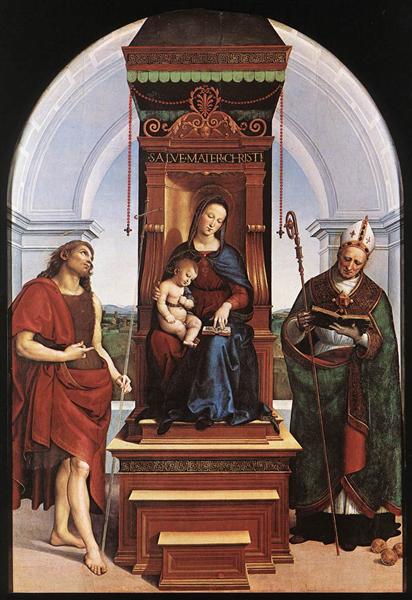Description
"The Virgin and Child with Saint John the Baptist and Saint Nicholas of Bari", painted by Raphael in 1505, is a work that encapsulates the mastery of the Renaissance, where religious devotion is combined with unparalleled technical subtlety. In this composition, Raphael manages not only to depict the saints, but also to evoke an atmosphere of peace and serenity, a hallmark of his style.
The painting depicts the Virgin Mary holding the Infant Jesus on her lap, a scene that touched the hearts of viewers of the time for its closeness and tenderness. Mary, dressed in a deep blue cloak that symbolises purity, shines in the soft light that seems to emanate from the Infant himself. The latter, naked and with a playful expression, plays with St Nicholas's staff, an element that reinforces the connection between divine childhood and humanity.
On either side of the Virgin are the figures of St John the Baptist and St Nicholas. St John, depicted as a young man with a lamb and a face that expresses both seriousness and contemplation, symbolises the forerunner of Christ, while the figure of St Nicholas, with his benevolent gaze, provides a contrast of maternal warmth. Both figures are arranged in a triangular arrangement, which not only provides compositional stability but also reflects the Renaissance art tradition of using geometry to project order and symmetry.
The treatment of colour is noteworthy; the warm tones that predominate in the clothing and surroundings contrast with the freshness of Mary's blue. Raphael's palette is characterised by harmony and balance, and here, the artist achieves a cohesion that envelops the characters in an aura of golden light. This luminosity not only highlights the importance of the sacred figures, but also suggests the divine connection that runs through the work.
The atmosphere emanating from this painting invites contemplation and meditation. The background is barely sketched, allowing the viewer's attention to be immediately drawn to the central scene, thus maintaining the emotional intensity of the moment depicted. The way Raphael models the figures—with a masterful use of chiaroscuro—gives their forms a three-dimensional character, a distinctive feature of his technique that elevates the visual experience by allowing the figures to seem almost alive.
The origin and context of this work in the Renaissance canon are of utmost importance. Raphael, at this period of his career, was beginning to establish himself as one of the great masters of his time. Influenced by the technique of Leonardo da Vinci and the grace of Michelangelo, Raphael manages to fuse these influences into a personal style that is both emotionally resonant and aesthetically sublime.
Although the work may not be as well-known as some of his other more celebrated pieces, such as The School of Athens or the more recognizable Madonnas, The Madonna and Child with Saint John the Baptist and Saint Nicholas of Bari stands out for its intrinsic humanity and serene beauty. It is a testament to Raphael's ability to express the divine through the human, inviting the viewer to find in this representation a connection with the sacred that transcends the limits of painting itself. Thus, it becomes a reference to the splendor of the Renaissance, where technique and spirituality come together in a perfect dance that continues to captivate art lovers to this day.
KUADROS ©, a famous painting on your wall.
Hand-made oil painting reproductions, with the quality of professional artists and the distinctive seal of KUADROS ©.
Painting reproduction service with satisfaction guarantee. If you are not completely satisfied with the replica of your painting, we will refund 100% of your money.

